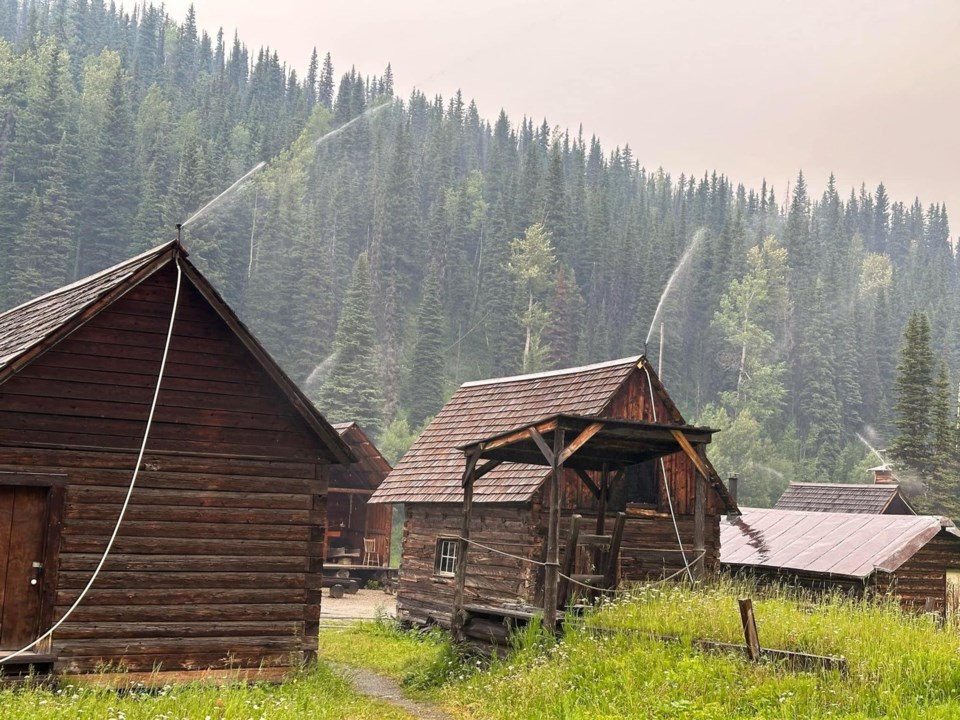When Stewart Cawood returned to British Columbia's historic gold rush town of Barkerville earlier this week, he said the town looked almost like it had been "ransacked."
Barkerville and the surrounding region had been evacuated several days earlier due to a nearby wildfire.
Firefighting crews had drenched the town, creating a so-called humidity bubble to shield it from the blaze.
Though the 143-square kilometre wildfire continues to burn out of control, all evacuation orders and alerts were lifted in the area by Monday.
Cawood, Barkerville's public programming and media manager, said the hoses that littered the town just days ago have now been removed as it prepares to reopen to the public Friday.
"Before all of this went down, we were having a great season," he said of the two-week closure.
"We were hoping to sort of start getting back to where we were before the pandemic. This has definitely put a dampener on all of that, but I do remain hopeful ... that people are going to come out and support us."
The historic town said in a news release that its programs will resume, though guests may see "elevated smoke" and its campgrounds, cottages and guest houses will remain closed until about mid-August.
It said people are welcome to make arrangements to stay at the Historic St. George Hotel, a private local business, or in neighbouring communities that have also "faced economic challenges with the recent evacuation orders."
The influence wildfires may have on tourism are not limited to B.C.'s Cariboo region.
Walt Judas, CEO of the Tourism Industry Association of BC, said there is "no question that wildfires have an impact on the visitor economy in B.C."
"Certainly, when a wildfire hits an area, it dissuades people from travelling there, particularly for leisure reasons," he said in an interview Wednesday. "But it also may force people to leave an area where they are vacationing, notwithstanding the impact on residents and businesses and so on."
Cawood said the 12-day closure has resulted in a loss of about $90,000 for Barkerville, accounting for loss of ticket sales, accommodation cancellations and paying for emergency staffing.
The impacts of the evacuation order will likely last longer than the smoke, he added.
"I do think we're going to see a downturn in tourism. We have had cancellations that go further into the summer than even just this immediate period," he said.
Judas said it's difficult to measure the economic impact on tourism revenue because there are numerous reasons for a slowdown, such as personal economic constraints.
"We do see places in the province where there is a softening on the number of bookings that they might normally expect at this time of the year," Judas said. "I would say that is partially attributable to the wildfires, but not necessarily entirely."
Recent rains and cooler temperatures have helped dampen some wildfire activity across the province.
In the north, conditions have improved to the point that the province is lifting campfire bans in the Prince George and Northwest fire centres starting Thursday.
However, Cliff Chapman, the director of provincial operations for the BC Wildfire Service, has said a hot, dry pattern is expected to return to the south by this weekend.
Many of the roughly 330 wildfires burning throughout B.C. are concentrated in the southeast, where hundreds of residents of the Slocan area were forced out of their homes due to the danger.
Bowinn Ma, B.C.'s emergency management minister, told a wildfire briefing this week that the province is still encouraging people to visit. However, she reminded travellers to be prepared by looking up the regional forecast, road conditions, highway closures and evacuation alerts.
"If you are travelling by car, it is important to have an emergency kit in your car, have sufficient water, food, extra clothing and emergency gear," she said, noting that wildfire behaviour is unpredictable and conditions can change quickly.
Maya Lange of Destination BC, a provincial Crown corporation, echoed Ma, saying B.C. is a "four season destination" that spans a large geographical area.
"We have many different areas that people can visit. It's not that all of the province is impacted by wildfires," she said in an interview.
But, the corporation said in a statement Wednesday that the economic impact on tourism varies each year. In 2023, it said "wildfires had an impact on accommodation performance within traditionally strong summer markets."
It said Osoyoos saw large occupancy declines starting July 29, 2023, recording record low rates the week of Aug. 20, just as wildfires were sweeping through the Shuswap and Okanagan regions.
"In wildfire-impacted areas, occupancy rates returned to previous-recorded levels in the fall."
But Lange, who is vice-president of global marketing with Destination BC, said tourism has grown since the end of the COVID-19 pandemic, particularly since 2022.
"There are areas of Canada and around the world where wildfires are a concern, but it isn't the entire country or the entire province," she said. "We are forecasting 2024 to be a very strong tourism year."
This report by The Canadian Press was first published July 31, 2024.
Brieanna Charlebois, The Canadian Press



